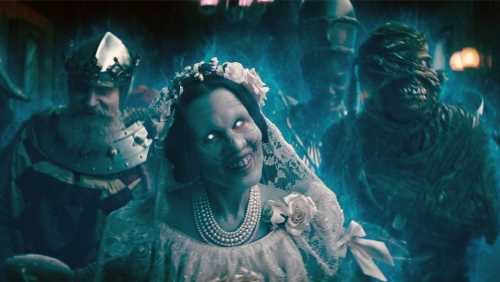When “Haunted Mansion” production designer Darren Gilford was working with director Justin Simien to bring the beloved Disney ride back to the big screen, he had a rather unique perspective. As a former Imagineering intern, Gilford had learned first-hand how the Disneyland attractions were conceived.
Gilford’s design entry point for the film was a bible devoted to the ride from Imagineering. “I got to know what was canon for Disney,” he says. “We really tried to be as true as we could to the original Haunted Mansion from Disneyland. It was going to be heavily based on all the icons from the ride.”
The film stars LaKeith Stanfield, Danny DeVito, Tiffany Hadish, Jamie Lee Curtis, Owen Wilson and Rosario Dawson as the crew who try to rid a stately old home in New Orleans of its 999 ghosts. But the exterior of Gracey Mansion was actually built on a backlot in Atlanta.
Gilford spent hours going through the ride at Disneyland, wanting to recreate the experience of entering the ride for cinemagoers, “but on a much larger scale.”
Gilford and his team gave the front yard a swampy vibe, and the house’s large, looming exterior build allowed Simien to play on the eerie shadows to create a haunting effect.
For the interiors, Gilford had to recreate all the familiar set pieces of the ride: the stretching room, the seance room, the giant dining room, the grand hallway and the library. He called upon graphic designer Ellen Lampl to create the house’s wallpaper from scratch, which changes color during the ghost realm scenes.

While Gilford incorporated many easter eggs, his favorite is Travis’s (Chase Dillon) bed, which is shaped like jaws, with “the torn fabric meant to look like teeth.” Another favorite is the organ in the dining room, mirroring the part of the ride in which the ghosts fly out of the instrument.
During reshoots, Gilford had the idea to incorporate the Medusa head from the ride’s wallpaper. Encouraging eagle-eyed viewers to look out for it, he says, “There’s a pumpkin carved with the classic Medusa head. At the last minute, I had this idea to do it, and this incredible artist in Atlanta sculpted it for me overnight.”

Gilford, Simien and the crew also wove in the doom buggy, the “Grim Grinning Ghosts” song, the grandfather clock that reads 13 ‘o clock and Leto’s hatbox ghost — a fan favorite that was reinstalled in the ride in 2015 after being removed due to technology glitches.
Production VFX supervisor Edwin Rivera was just as vital to capturing the essence of the ride. Rivera, who works for DNEG, came together with Industrial Light & Magic to deliver over 1,700 shots for the film. Together, they extended sets such as the hallways and the world beyond the house, as well as enhanced the ghoulish ghost realm.
Cinematographer Jeffrey Waldron worked to capture the ride’s “candlelit, hazy exaggeration of horror” in the film. He says working with candelabra and moonlit sets are “a cinematographer’s playground. We wanted to make sure it always felt spooky but had enough richness to support the comedic beats.”
In bringing the 999 ghosts of the haunted mansion to life, Simien wanted to use actors and not fill the entire film with computer-generated ghosts. Says Rivera, “He wanted things to feel grounded and realistic, so he put actors in makeup. But then it was: How do we take that and make it more ethereal?”
Actors playing ghosts hung from wires and were later digitally enhanced, which helped the lead cast in their performances. “There are ‘The Shining’ and ‘The Ring’ moments where there’s actually someone in the room and it’s very unsettling. It makes you want to leave the room, and it felt like an ’80s horror movie.”
Read More About:
Source: Read Full Article
